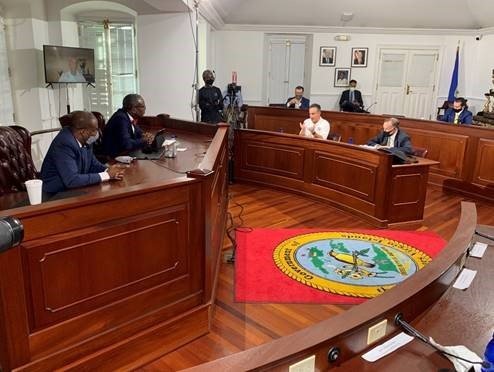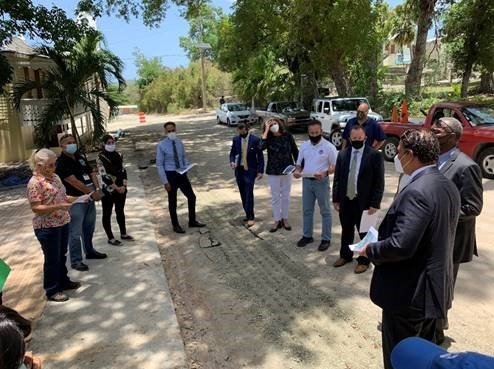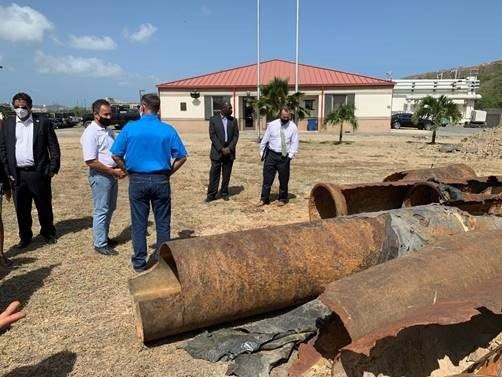Senior EPA Officials Wrap up Visit Focused on Strengthening U.S. Virgin Islands Recovery Efforts
U.S. VIRGIN ISLANDS – U.S. Environmental Protection Agency (EPA) Associate Deputy Administrator Doug Benevento and Region 2 Administrator Pete Lopez wrapped up a visit with U.S. Virgin Islands Governor Bryan and other senior officials yesterday. The fruitful visit was focused on the challenges and successes of the continuing U.S. Virgin Islands recovery work and forging partnerships and finding ways to further support those efforts. Headlining the visit was the award of $10 million in funding under the Bipartisan Budget Act to support the U.S. Virgin Islands’ broad efforts to address its solid waste crisis.
“It was an honor to meet Governor Bryan and learn about his government’s efforts and some of the roadblocks they face on their long road to recovery,” said Associate Deputy Administrator Doug Benevento. “I gained an appreciation for the need for EPA’s partnership and collaboration with Virgin Islands’ agencies and this trip reinforced my respect for the need for local decision-making as we all work toward full recovery for the U.S. Virgin Islands.”
“Through our engagements with Governor Bryan and his excellent staff we were able to see first-hand the progress being made and discuss in a collaborative fashion where we can do better. I come away with renewed energy to continue to work with the U.S. Virgin Islands,” said Regional Administrator Pete Lopez. “EPA looks forward to continuing its important work, key investments, and successful efforts toward disaster recovery working should-to-shoulder with our trusted partners while fostering strong relationships with the communities across the islands.”
The trip began Wednesday morning at the Government House in St. Croix, where the senior EPA officials participated in an open discussion regarding the U.S. Virgin Islands’ environmental and human health disaster recovery issues and critical needs, including the solid waste crisis in the U.S. Virgin Islands. EPA’s Associate Deputy Administrator Benevento, U.S. Virgin Islands Governor Bryan and EPA Regional Administrator Lopez announced the award of critically needed $10 million from EPA to the U.S. Virgin Islands for hazardous and solid waste management assistance. This funding is awarded through the Supplemental Appropriation for Disaster Relief under the Bipartisan Budget Act of 2018, which provides supplemental appropriations to respond to and recover from hurricanes. Commissioner Jean-Pierre L. Oriol and representatives from the U.S. Virgin Islands Department of Planning and Natural Resources (VIDPNR) were in attendance.
“Today’s grant award is a major step forward in our administration’s efforts to solve the Territory’s solid waste crisis,” said Governor Albert Bryan Jr during yesterday’s visit. “The EPA has been a tremendous partner in our efforts to improve the Territory’s solid waste infrastructure, and we are grateful for their continued support.”
“This is an important grant from the EPA and we here in the Virgin Islands want to thank them for this support,” said Congresswoman Stacey E. Plaskett (USVI-1). “By providing efficient waste management and recycling, the Virgin Islands can boost our reputation as a place that takes waste management seriously. Potential and existing customers will see us as a responsible and sustainable Territory that cares about the environment, the future and the population. An incredible benefit of waste management is it can cut overall production costs in the long run. Recycling helps to conserve natural resources such as glass, plastic, paper and oil. Reusing these materials will place less strain on our natural resources and lower the cost of production. This grant will go a long way in maintaining the environment in the Virgin Islands.”

Following the announcement, the trip continued with a visit to the Frederiksted Waterline Rehabilitation project, led by VIDPNR Commissioner Oriol and other key representatives. EPA underscored its commitment to supporting the Virgin Islands Water and Power Authority and VIDPNR throughout the ongoing replacement of nearly 18,000 ft of aging iron pipes. Recent Clean Water Act Construction Grants from EPA to the U.S. Virgin Islands are key to strengthen and improve the Territory’s drinking water and wastewater infrastructure, ultimately protecting resident health.

The visit concluded with EPA officials joining Ann Hanley, the Virgin Islands Waste Management Authority (VIWMA) Acting Director as they visited the Anguilla Landfill and Anguilla Wastewater Treatment plant. As recent as July 2019, the Anguilla Landfill caught fire, rendering the transfer station inoperable and destroying heavy equipment that was vital to landfill operation. Separately, the Anguilla Wastewater Treatment plant has struggled for decades to meet the necessary requirements of EPA Consent Decrees. In both cases, the U.S. Virgin Islands government is making some strides to improve operations. Funding sources such as the EPA supplemental grant announced yesterday and the $30 million already provided to the U.S. Virgins Islands to address water infrastructure are and will be a big part of that progress.

It is EPA’s goal to continue to work collaboratively with the U.S. Virgin Islands as they address the challenges of recovery.
To learn more about EPA’s work in the U.S. Virgin Islands, please visit https://www.epa.gov/vi
Follow EPA Region 2 on Twitter at http://twitter.com/eparegion2 and visit our Facebook page, http://facebook.com/eparegion2
20-056
